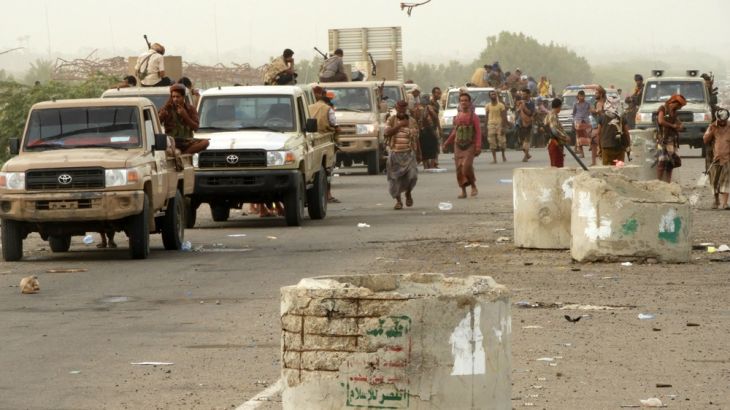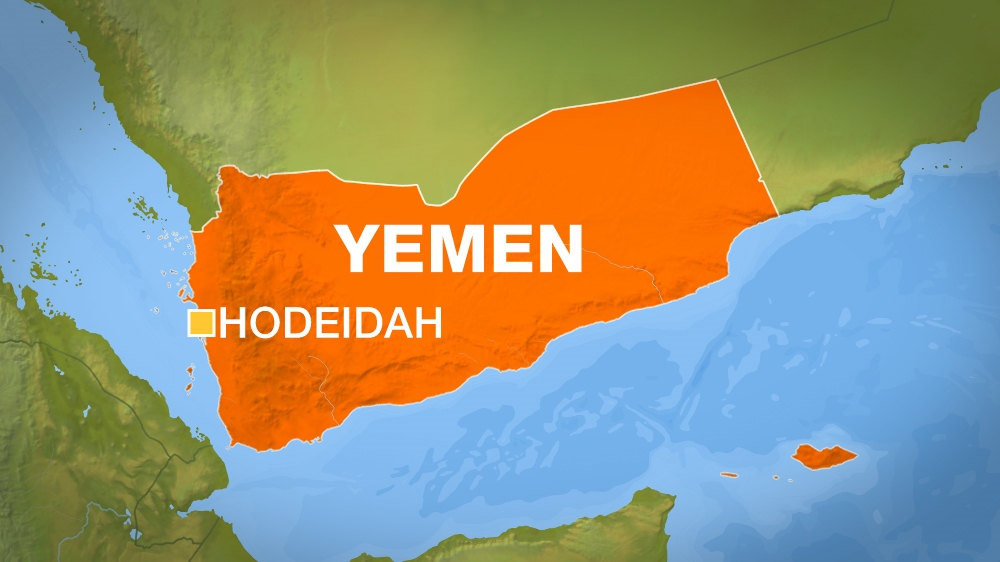UNSC to hold emergency session amid assault on Yemen’s Hudaida
The closed meeting requested by the UK comes as residents flee outskirts of city fearing incoming air attacks.

The United Nations Security Council (UNSC) has called for an emergency session as the Saudi-Emirati military assault on the Yemeni port city of Hudaida entered its second day.
The closed meeting, requested by the United Kingdom, will take place on Thursday afternoon. It will be the second time the Council convenes this week over the situation in Yemen, which aid groups warn stares at an imminent humanitarian crisis.
Keep reading
list of 4 itemsUS blocks Palestinian push for full UN membership at Security Council
Why is Germany maintaining economic ties with China?
UN’s Libya envoy resigns citing no hope for political progress
On Wednesday, the Saudi Arabia and United Arab Emirates (UAE) launched an air and ground offensive on Hudaida, Yemen’s third largest city, in the biggest battle in the three-year war between the coalition and Iranian-aligned Houthi rebels.
The air attacks targeting Houthi positions have been supported by ground operations by foreign and Yemeni troops south of the Red Sea port.
Fighting raged near Hudaida airport and al-Durayhmi, a rural area 10km south of the city, UAE’s WAM news agency said.
It also said that UAE forces and local allies had penetrated the Houthis’ front line on the airport perimetre.
Coalition spokespeople said 18 air attacks were fired on the outskirts of Hudaida on Wednesday.
The Houthis deployed military vehicles and troops in the city centre and near the port, as warplanes struck the coast to the south, residents told Al Jazeera.
Fear of ‘full-fledged war’
The rebel fighters have been instructing residents in the outskirts to leave their homes for the city centre for days.
“Today I heard warplanes hovering and the sounds of explosions,” a 20-year-old woman, who wished to remain anonymous for fear of reprisal, told Al Jazeera.

The mother of two decided to leave her village of Taif a few days ago, “during the last few days of the holy month of Ramadan”.
“We walked on foot with nothing but the clothes on our backs,” she said of her and her extended family members, who walked some 10km.
Residents of the city have been experiencing a relative calm prior to the assault. The sounds of warplanes and air attacks have frightened many who wonder if the city was soon going to see a “full-fledged war”.
The possibility of food running out is also among the residents’ main fears.
“We have enough food for now, but we don’t know if we’ll have more of it if the port completely shuts down,” 18-year-old Safaa, who requested her real name to be withheld, told Al Jazeera.
The attack’s objective is to push Houthi fighters out from the city, which has been under their control since 2014. Apart from Hudaida, the Houthis control the capital, Sanaa, and most of the country’s populated areas.
With logistical support from the US, the Saudi-led coalition has been carrying out attacks inside Yemen since March 2015, killing at least 10,000 people, in an attempt to reinstate the internationally recognised government of President Abu-Rabbu Mansour Hadi.
Houthi leader Mohammed Ali al-Houthi criticised the coalition’s allies. In a statement, he held the US and Britain responsible for the Saudi-backed attack on the vital port city.
Yemen’s government said Wednesday that negotiations had failed to force the Houthis from Hudaida, and that a grace period for UN-led peace efforts was over.
Meanwhile, the UN special envoy for Yemen Martin Griffiths, said he was continuing to negotiate on keeping Hudaida open and urged all sides to exercise restraint.
On Monday, the UNSC said it supported Griffiths’ diplomatic efforts but did not specifically call on Saudi Arabia and the UAE to refrain from attacking the city – a key point for aid supply.
‘We came on foot’
For the last few weeks, the UN had been trying to broker a deal in a bid to avert the attack, which it fears would further hinder Yemenis’ access to food, fuel and medicine – worsening the world’s most urgent humanitarian crisis.
The Hudaida port is a vital lifeline that is crucial for the flow of food supplies into a country that is on the brink of famine, as it serves the entry point for 70 percent of the country’s imports.
Riyadh and Abu Dhabi maintain that the port is being used to smuggle weapons.
They say they will attempt to keep the port running and can ease the crisis once they seize it by lifting import restrictions they have imposed.
|
|
Lise Grande, the UN humanitarian coordinator for Yemen, said the organisaiton would continue to deliver aid supplies.
“We are there and delivering, we are not leaving Houdaida,” Grande said.
“We have a ship offloading food even as shelling and bombing is happening. Humanitarians will not walk away,” she told Reuters News Agency from the capital, Sanaa.
Two Saudi and UAE aid ships were in the waters off Hudaida, coalition spokesman Turki al-Maliki told Saudi state media.
The two countries also said they would operate a dedicated shipping lane to Hudaida from Abu Dhabi and the southern Saudi city of Jizan to deliver food and medical supplies
About 600,000 people live in and around Hudaida, and “as many as 250,000 people may lose everything – even their lives” in the assault, the UN has warned.
The war in Yemen has displaced 2 million more and helped spawn a cholera epidemic.
With additional reporting from Manal Abdulrahman in Hudaida.
|
|